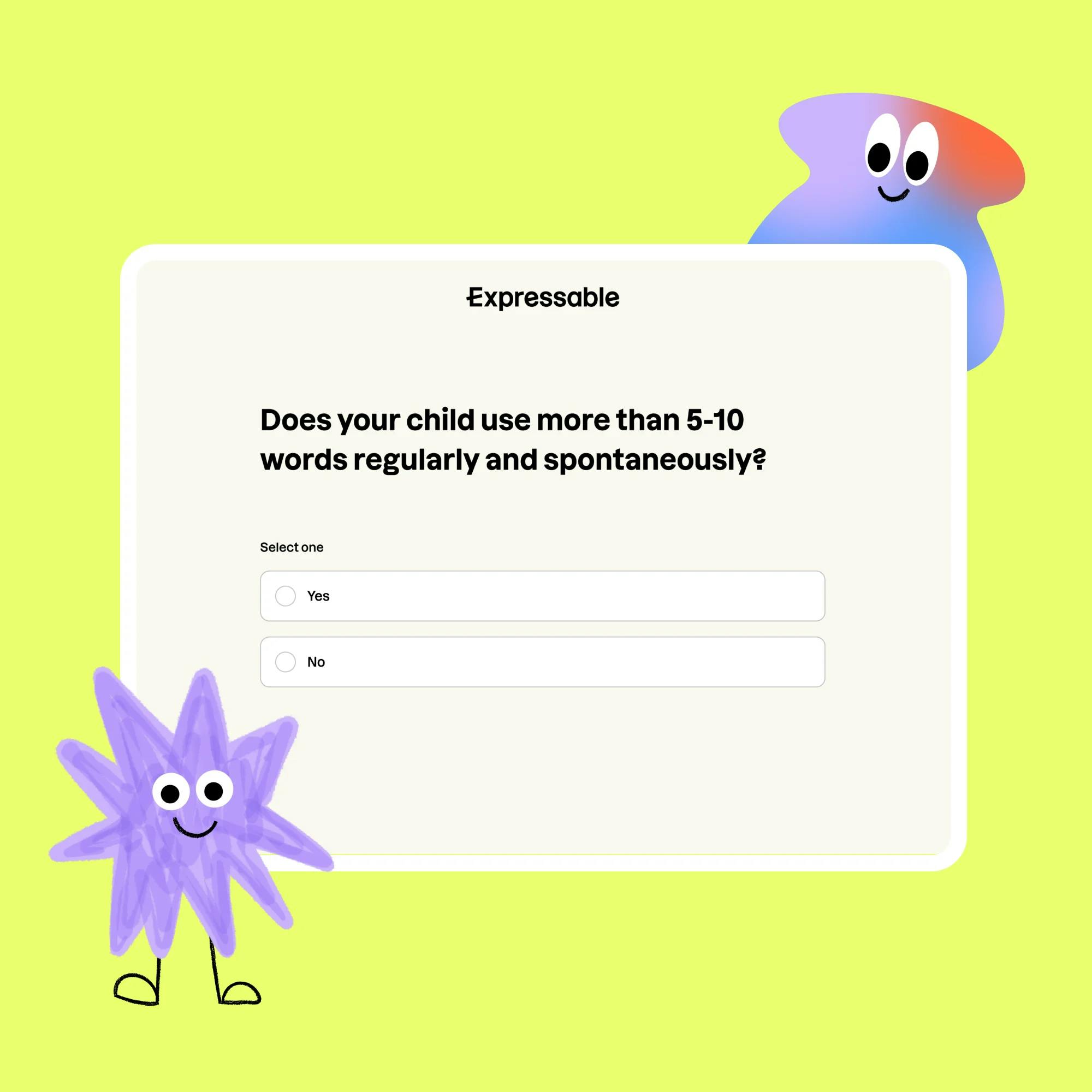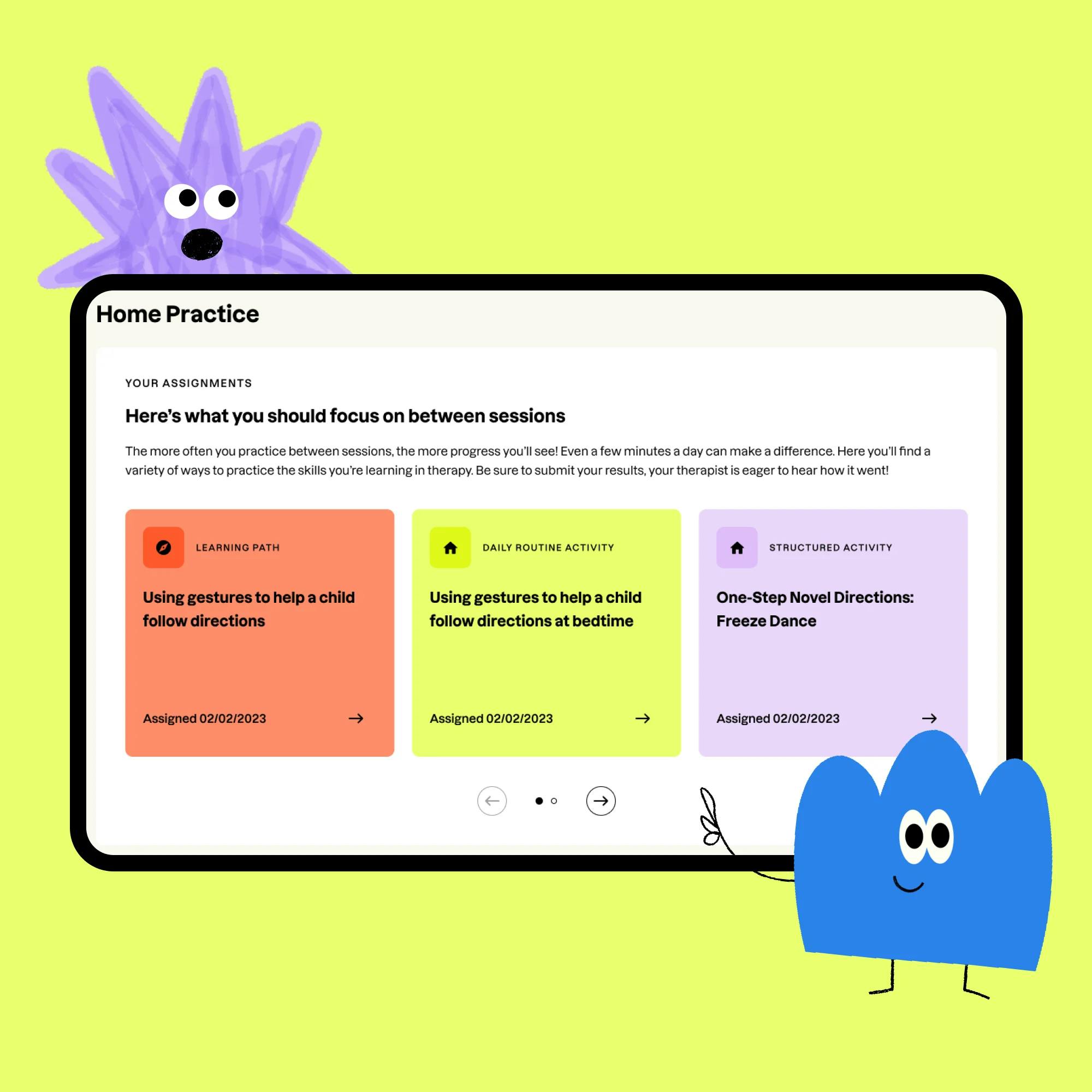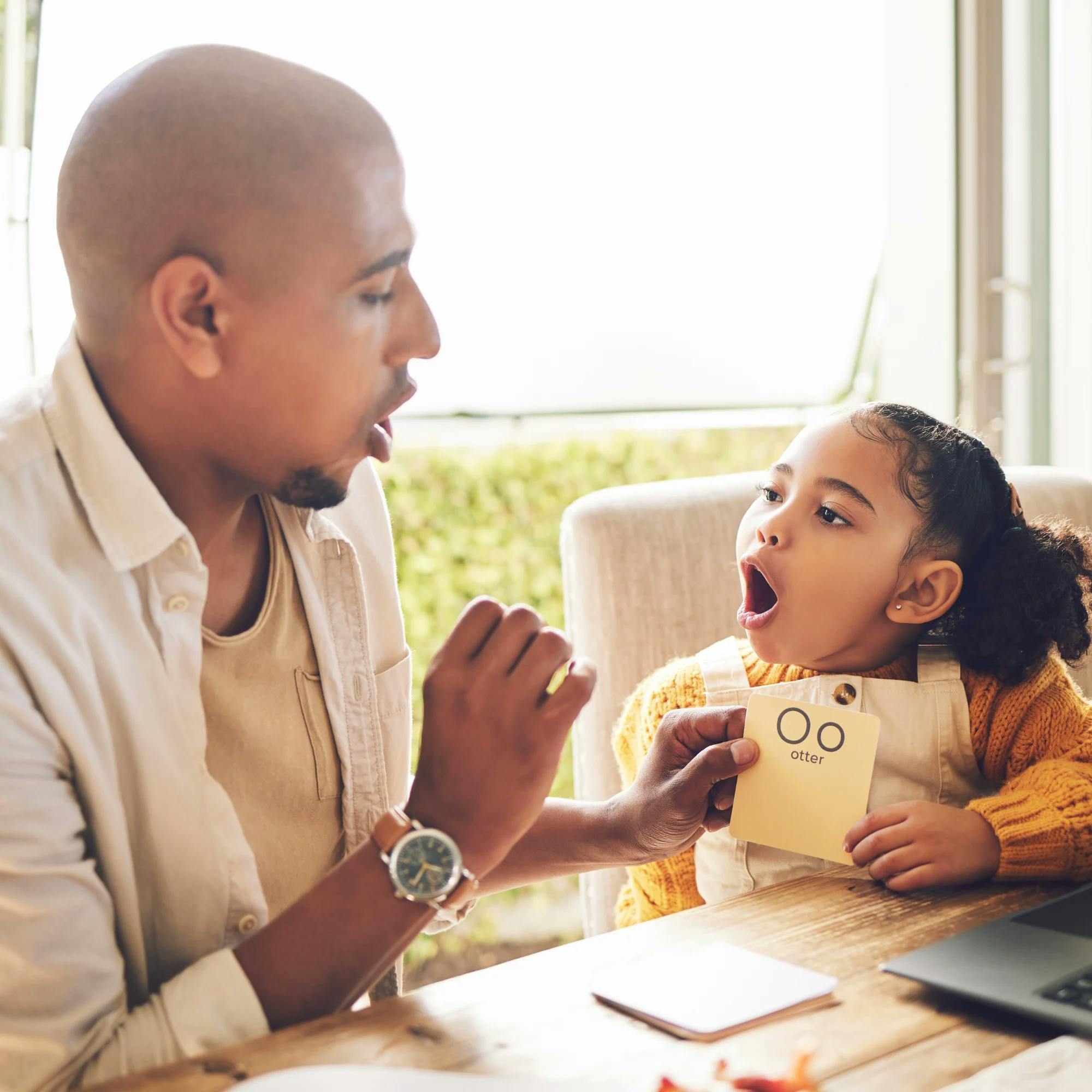
The Ultimate Guide to Speech Therapy for Children
 Abby Barnes, M.S., CCC-SLP
Abby Barnes, M.S., CCC-SLP
Communication is one of life’s most fundamental life skills. It’s how we express ourselves and understand the world around us. Raising a child to become a clear and confident communicator can help them express their thoughts and feelings, be understood by others, and do well in school. It also contributes to their overall emotional and social well-being.
With that said, many children will need extra help reaching the developmental speech and language milestones for their age. In fact, nearly 8% of children experience communication challenges as they grow up. In many cases, professional intervention like speech therapy is needed to help them overcome these obstacles.
Nearly 8% of children experience communication challenges as they grow up.
In this guide, we cover everything you need to know about improving your child's communication skills and the basics of how speech therapy can help.
Looking for a speech therapist?
Teletherapy makes it easy. We serve families with a range of speech, language, and feeding needs across the U.S. Get started today!
 Find a speech therapist
Find a speech therapistHow can speech therapy help children?
Speech therapy can help children better express their wants, needs, and opinions, as well as understand both verbal and nonverbal language. This can lead to a decrease in a child’s frustration or emotional difficulties that often come along with a delay in speech or language.
Speech therapy may also help children reach functional communication goals, such as expanding their vocabulary, sentence structure, comprehension abilities, social communication skills, and other important goals that can affect their daily life and school performance.
When we help a child increase their communication abilities to an age-appropriate level, it sets them up to meet the milestones to come. Because many communication goals build on one another in a certain order, early intervention can help grow and improve a child’s communication so they don’t fall further behind.


What does speech therapy treat?
Children often begin receiving speech therapy because their pediatrician, parent or caregiver, or teacher identified a delay in the child’s communication abilities.
After an initial evaluation, a speech-language pathologist, also known as a speech therapist, will diagnose your child's challenges and set goals to help them grow their speech and language abilities. Here are a few reasons children begin receiving speech therapy:
Speech delay: When a child is not meeting typical speech milestones expected for their age.
Speech sound disorders: When a child has difficulty saying sounds or words correctly past a certain age. Some sounds that may be hard for children to master include /r/, /s/, /l/, /sh/, and /th/.
Language disorder or delay: A type of communication disorder that makes it difficult to use, process, and comprehend language. Children with language disorders might have trouble understanding what other people are saying (receptive language) or expressing their own needs or feelings (expressive language).
Stuttering: Stuttering, sometimes called stammering or disfluency, is a communication disorder that disrupts that natural flow of speech. People who stutter often repeat certain syllables, words, or phrases (li-li-like this), prolong them (lllllike this), or experience abnormal stoppages of certain sounds and syllables.
Voice disorders: This can occur when our vocal folds are unable to properly vibrate. This might happen when vocal folds become inflamed; develop nodules, polyps, or other growths; or are unable to move properly. Voice disorders can affect the pitch, volume, or quality of your voice.
Lisping: Many of us know what a lisp sounds like. The most common form occurs when children make a /th/ sound when trying to say a /s/ or /z/ sound. Lisps are caused by the incorrect placement of a person’s tongue inside their mouth during speech.
Apraxia of speech: Children with apraxia have difficulty coordinating the mouth movements needed to turn sounds into syllables, syllables into words, and words into phrases. This can make children hard to understand as they struggle to form coherent sounds and sentences.
Social communication disorder: Children with a social communication disorder (which you may sometimes hear called a pragmatic language impairment) struggle to use communication appropriately in social situations. This can make it hard for them to follow the social “rules” of a spoken conversation.
There are many other reasons a child could benefit from speech therapy, such as swallowing/feeding disorders related to a child’s oral-motor development. What's important is that you speak with a certified speech therapist if you suspect your child is struggling with their communication or feeding development.


What are some warning signs that a child's communication may be falling behind?
It’s important to watch your child's communication development from the moment they’re born. The good news is that many signs of a communication issue can be seen before a child even says their first word. The strength of a child’s nonverbal communication is a good early sign of whether they’re progressing typically. A few early language signs to look for include:
Your child can focus on a shared object with another person. This is called joint attention.
They maintain eye contact and respond to your sounds and gestures.
Your child is engaging in play activities.
They can vocalize with babbling (such as “baba” or “mimi”) or other sounds when responding.
If your child doesn't appear to be meeting the age-expected milestones mentioned above, you may begin to see them get frustrated. Many behavioral issues in a child's younger years can be caused by their inability to communicate their wants and needs.
When a child’s language is developmentally delayed, they may seem to be “stuck” at one certain stage--perhaps relying on gestures or crying to communicate, as opposed to starting to use words. That visible (and sometimes audible!) frustration may signal that they need extra support to grow their communication skills.


How do I know if my child needs speech therapy?
The stages of early language development are universal among humans. A baby’s cries soon turn into cooing and babbling, and their first words follow shortly after. These foundational language skills reflect the growth and maturation of brain development. They're essential to building more complex language abilities that allow children to clearly express their thoughts, feelings, and ideas.
Speech and language delays occur when a child doesn’t meet milestones typical for their age. These are common developmental concerns, with speech delays affecting about 10% of preschool-age children, and language delays affecting about 3% of children.
Every child develops on their own timeline. While the stages of communication development are universal, there can be variance in when children reach them. This can make it hard for parents and caregivers to know whether their child is simply a late bloomer, and will soon be using language and talking a mile a minute, or if there’s a more serious problem that requires intervention. While it can be tempting to take a “wait and see” approach, you may be missing the early warning signs of a possible problem.
While it can be tempting to take a “wait and see” approach, you may be missing the early signs of a problem.
The decision on when a child should begin receiving speech therapy should be made by a licensed speech therapist after a formal evaluation. It’s important to speak with your pediatrician or speech therapist about whether a speech evaluation is needed.
If you have a specific concern about your child’s speech, and you don't see them making progress over one to two months, this is another sign that it could be time to talk with a speech therapist. You can start by taking our easy online screener. You'll get comprehensive, personalized results and find out if a speech evaluation is recommended.

What age do children start speech therapy?
The age at which a child begins speech therapy depends on what aspects of language they struggle with, when the communication challenge presents itself, and how severe the problem is.
Some children start speech therapy as babies, while others begin speech therapy later, during school-age years. This is because speech and language delays can present themselves early in a child’s life (while they’re still developing basic nonverbal communication skills), or later in life (when a child is ready to enter school). Regardless, it’s important that any possible problem is screened by a speech therapist as early as possible.
How long do children receive speech therapy?
The length of speech therapy varies for all children. These factors contribute to the length of speech therapy:
Severity of the speech disorder
The type of speech disorder
Any underlying medical conditions
How early a child starts speech therapy
The frequency of speech therapy sessions per week/month
How often a child practices at home in order to continue progress between sessions
Some speech and language issues improve naturally over time and are resolved within childhood. Others can persist into adulthood and may require long-term therapy. After a formal speech evaluation, a speech therapist can help give families a better understanding of the recommended frequency and possible length of treatment.


How do speech therapists work with children?
Speech therapists work with children by targeting their speech and language goals in a variety of ways. Many times, speech therapists will choose fun games and activities that the child enjoys in order to elicit speech production and practice.
At the beginning, the speech therapist will provide frequent help and cueing to prompt the child as they gain new skills. The goal is to decrease the amount of cueing provided over time. This ensures that the child masters the skill at an independent level, and most importantly, is able to carry over that skill and use it throughout their day-to-day life.
As much as a speech therapist works with the child, they also work closely with their parent!
As much as a speech therapist works with the child, they also work closely with their parent and caregiver! In fact, the more that parents are involved in their child's care, using the same techniques their therapist uses throughout the child's daily life, the more progress children will make toward their goals.
Get matched with a speech therapist who's right for you
Get started nowSpeech and language milestones for children
What age should my child start talking?
The first three years of a child’s life are their most formative in terms of speech and language acquisition. Preverbal and verbal communication skills are best achieved in a language-rich environment, with consistent exposure to sights, sounds, and speech from the people and world around them.
Children should begin saying their first meaningful words around their first birthday. However, all children are different, and this important milestone may happen a little earlier or later. Regardless, it’s important for parents and caregivers to closely monitor their child’s speech and language milestones to ensure they’re on track.
If your child is three months past their first birthday and still not using any words, talk to your pediatrician or a speech therapist.
If your child is three months past their first birthday and still not using any words to communicate, talk to your child’s pediatrician or a speech therapist. It’s especially important to speak with one of these professionals if you notice your child becoming frustrated by their inability to express their wants and needs.
Speech and language milestones for babies to 1-year-olds
Fun fact: Speech and language development begins long before a baby’s first words are ever spoken. From the moment a child is born, there are many nonverbal communication milestones, like babbling or even a smile, that are good indicators of how they're progressing. Below are several milestones you should look for within your child’s first 12 months of life:
0-3 months: Responds to sound, calms down when hearing a familiar voice, coos, cries, and smiles
3-6 months: Pays attention to music, shifts eyes in response to sound, mouths toys, begins to laugh, starts babbling (such as “baba” or “mimi”), and recognizes different tones of voice (such as happy, sad, angry)
6-9 months: Participates in simple games like “peek-a-boo,” shakes objects, waves, and continues to babble
9-12 months: Says their first word, responds to words/phrases, participates in joint attention (two people paying attention to the same items), imitates your sounds, responds to simple requests like “sit down”
Speech and language milestones for 2-year-olds
This is the stage where your child progresses from baby to toddler pretty quickly! It's a period of rapid growth, maturity, and brain development.
However, this big leap in language abilities and vocabulary expansion doesn't happen overnight. And it certainly doesn’t just happen on its own. There are many foundational verbal and nonverbal skills that build upon each other throughout your baby's second year. Watching for these important speech and language milestones, and promoting their growth, can help children become a confident communicator.
A 2-year-old child should be meeting the following milestones:
Uses (or is close to using) 2-word phrases like “more juice”
Says about 50 different words
Begins to build a vocabulary and regularly learn new words
Follows simple 2-step directions
Identifies objects and items in pictures accurately
Correctly identifies body parts
Asks for help verbally
Answers/responds to simple questions
Plays independently
If you notice your child is struggling with these tasks, chances are there may be some earlier skills that your child hasn't yet mastered.
Speech and language milestones for 3-year-olds
A 3-year-old child should be able to do all of the following:
Use a vocabulary of 400+ words
Speak in at least 4-word sentences
Accurately pronounce the sounds /k/, /g/, /f/, /t/, /d/, and /n/
Answer questions easily
Communicate details about their day/routines
Understand spatial concepts (in, on, under, etc.)
Identify most colors
Speech should be at least 85% intelligible to an unfamiliar listener
Express wants/needs with ease
If a 3-year-old child is not meeting these skills, or you notice your child is getting frustrated frequently, it could be time for a speech evaluation.
Speech and language milestones for 4-year-olds
A 4-year-old child should be able to do all of the following:
Engage in conversation easily
Ask questions
Interact well with other children their age
Follow 3-step directions
Tell a 3-step story/a short narrative
Name letters and numbers correctly
Understand concepts like long/short, big/small, hot/cold
Speech and language milestones for school-age children
School-age children should be able to do all of the following:
Have clear speech that is understood by others 100% of the time
Use accurate sentence structure
Use correct verb tenses
Use correct pronouns/possessive pronouns
Initiate conversation with other children their age
Stay on topic and introduce new topics in conversation
Follow rules with ease
If your child isn't meeting these skills, be sure to speak with their pediatrician or a speech therapist.
Click these links to learn about 5-year-old and 6-year-old speech and language milestones.
Speech therapy exercises for children
Speech and language development doesn’t require scheduled practice or fancy materials--it can be a natural part of daily interactions with your child! The more parents and caregivers take time to meaningfully interact with their kiddos, the quicker they’ll reach communication goals. That’s why it’s important to include language practice in the activities you’re already doing with your child, like eating breakfast, getting dressed, brushing your teeth, and riding in the car.
Here are some general activities and strategies that can be practiced at home to promote language growth at any age:
Modeling sounds and speech: Model the length of phrases and sentences that you want your child to say. If your child is nonverbal, modeling sounds will encourage them to imitate you. If you hear a car engine, say “vroom vroom,” or if you see a dog, say “ruff ruff.”
Modeling phrases: If your child is already talking, model phrases that are one word longer than what they're currently using. For example, if your child is using single words, model two-word phrases to help them practice. If they are saying two-word phrases, model three-word phrases to expand the length of their verbalizations. This article explains how to use modeling to help your child use longer phrases.
Talk regularly: Children learn language by listening to those around them. Talk frequently to your child, and make sure to pause, giving them opportunities to respond.
Playtime: One of the best ways parents can promote strong communication skills is also one of the simplest: playing with their child. The natural back-and-forth of playtime mimics how we communicate. For example, rolling a ball between you and your child requires turn-taking, just like a conversation. Playing with your child also helps improve their joint attention (ability for two people to focus on the same task) and cause-and-effect relationships (stack the blocks too high and they’ll come tumbling down). Check out this article for more information on the importance of playtime to promote language growth.
Reading regularly: Reading helps children expand their vocabulary, recognize sentence structure, improve comprehension, and stimulate their imagination! As with most things, it’s best to start early. Creating reading habits with infants and toddlers helps support early literacy development. When your child is old enough to participate, ask them to identify different items in photos. If they’re a little older, ask thought-provoking questions, like “Why did the character feel that way?” or “What do you think will happen next?”


Speech therapy for kids online
What is online speech therapy for children?
Online speech therapy is just like meeting with a therapist in-person, except sessions are done virtually, from the comfort of home. Research has shown that most communication issues can be effectively treated online (more below!).
With Expressable, you’ll be assigned a speech therapist that’s licensed in your state, available when you are, and specialized in your child’s area of need. Your speech therapist will recommend an appropriate frequency of treatment depending on your child’s needs.
During these live, one-on-one sessions, your speech therapist will help your child grow their communication abilities through targeting individualized treatment goals. Your speech therapist will also provide tips and techniques to practice at home between sessions, helping your child make faster progress.


How does online speech therapy for children compare to in-person?
The main difference between online and in-person speech therapy is simply how the therapy is delivered. Many children are more comfortable having sessions at home, and they enjoy the games and activities that their therapist presents over the screen.
For very young children, or those who struggle with attention issues, online speech therapy is still a good option.
For very young children, or those who struggle with attention issues, online speech therapy is still a good option. Toddlers and infants learn language by interacting with those around them--and no one spends more time with your child than you! During virtual therapy sessions, your speech therapist will focus on caregiver coaching and education to help you use speech therapy exercises at home, during daily interactions with your child.
There are many benefits to the caregiver coaching model. The caregiver learns how to work on speech goals with their child. This allows practice to continue on days when the child doesn't meet with their speech therapist. Practice at home can even decrease the length of speech therapy!


Is online speech therapy for children effective?
Multiple studies have compared the effectiveness and outcomes of speech therapy delivered online versus conventional, in-person settings. Many of these prominent studies, including those conducted at Kent State University and by the Ohio Department of Public Education, found that children made similar progress toward their communication goals regardless of how speech therapy was delivered. Each study used GFTA-2 (Goldman-Fristoe Test of Articulation) scores to measure progress, which is one of the most popular and credible tests used to assess speech articulation in children and adults.
Based on this strong body of evidence, the American Speech-Language-Hearing Association (ASHA), which is the credentialing association for speech-language pathologists, has recognized online speech therapy as a valid means of service delivery.
You can learn more about the effectiveness of online speech therapy here.
How do children benefit from online speech therapy?
Children benefit from online speech therapy through consistent, face-to-face speech therapy sessions with an assigned speech therapist. At the beginning of therapy, a formal evaluation is conducted by the speech therapist. This allows the speech therapist to identify the child’s strengths and weaknesses, and to create an individualized treatment plan with goals that help the child increase their communication skills.
Children also benefit from online speech therapy because virtual sessions are easier for many families to access. For working families, online therapy can be conveniently set up around busy schedules, including on weekends and evenings, without long commutes or waiting times.
Virtual sessions are easier for many families to access.
Plus, online speech therapy is often more affordable. For example, Expressable can cut out many of the operational costs of running a traditional speech therapy practice, like expensive rent and administrative costs. These price savings are passed down to families.
How to keep your child engaged with online speech therapy
Here is a list of things you can do to help your child stay engaged and interested with online speech therapy.
Use a laptop or tablet that can connect well to the internet for all therapy sessions. A phone will work, but devices with a larger screen are preferred.
Maintain a quiet, distraction-free space for your child.
Keep some preferred toys, books, or snacks nearby. Your speech therapist may use these during therapy! You can even keep these toys as special “speech toys” that only make an appearance during speech sessions. This serves as great motivation for little ones.
Children often need a few sessions to get used to this new structure. Don’t worry if your child seems to have trouble paying attention at the beginning! Speech therapists have a lot of experience working with children and using various techniques and activities to help them stay engaged and ready to learn.


How does online speech therapy help with home practice?
Online speech therapy works well to facilitate home practice. This can happen in a few ways.
1. The caregiver is encouraged to sit alongside their child, watch the session, and ask the speech therapist questions. This allows the caregiver to understand what is being targeted in the session. The speech therapist will explain how and what to practice at home, as well as how often to practice. This quality face-to-face time with your speech therapist isn't always possible when speech therapy happens at school or in a clinic.
This face-to-face time with your speech therapist isn't always possible when speech therapy happens at school or in a clinic.
2. The speech therapist may speak with the caregiver at the end of the session if the caregiver wasn't involved during the session. The speech therapist would review the goals targeted as well as the home practice for the week.
3. At Expressable, we also provide HIPAA-compliant text messaging. You can communicate with your speech therapist via texting throughout the week to stay up-to-date on your child’s progress and answer any questions.

Is online speech therapy secure?
At Expressable, we take your privacy and confidentiality seriously. All the technology we use, including our secure video and text messaging platforms, are HIPAA-compliant. The Health Insurance Portability and Accountability Act (HIPAA) is a federal law that helps protect and safeguard your sensitive information, with regulation on the use of safe and compliant technology.
Have more questions about speech therapy? Click here to get matched with one of Expressable's licensed and experienced speech therapists.
How Expressable Can Help
Concerned your child isn't reaching age-expected milestones? Looking for communication support from a professional? Expressable is a national online speech therapy practice serving children and adults. We treat all major areas of communication and feeding, offer flexible hours including evenings and weekends, and accept most major health insurance plans. We’re proud to have earned more than 3,000 5-star reviews from our clients (4.9/5 average).
Our therapy model is centered on parent and caregiver involvement. Research proves that empowering caregivers to participate in their loved one’s therapy leads to better outcomes. That’s why we combine live, 1-on-1 speech therapy with personalized education and home practice activities for faster progress.
Communication is more than words. It’s how we share how we feel and show who we are. We’re here to help you or your child do just that.









